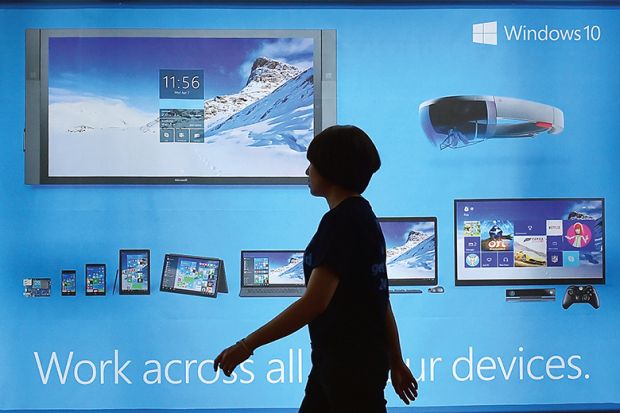Liberal arts colleges have long promised prospective students that a humanities education is more durable in the long run, providing the adaptive skills needed to change jobs multiple times in a fast-evolving economy, even as science and technology degrees attract higher initial demand and salaries.
Students and their families have largely remained sceptical, in both the US and Canada. US government data show a 7 per cent drop in liberal arts degrees over the past decade. Canada’s universities estimate their decline over that period as ranging between 10 and 40 per cent.
One institution, however, is claiming a 228 per cent increase over 10 years in the number of its liberal arts graduates hired by technology companies, and a 333 per cent increase in the number hired by the financial industry.
A key difference at the University of Waterloo in Canada, its leaders and students say, is its longstanding cooperative education programme, in which students intersperse their studies with semesters spent working in jobs related to their fields.
“I think we’re doing something right,” said Norah McRae, Waterloo’s associate provost for cooperative and experiential education, citing the gains in financial sector hiring of its liberal arts graduates, from 81 in 2007-08 to 358 in 2017-18, and in technology industry hiring from 162 to 531.
That experience, said one such student, Sobhi Memon, puts them in a position where their liberal arts training is immediately applied and seen. Mr Memon, now nearing the end of his degree in political science and business at Waterloo, is on a co-op placement at Microsoft in Toronto, helping to manage the technology giant’s relations with partners that include Best Buy, Amazon and Walmart.
Mr Memon said he came to Waterloo intending to pursue law school, completed an initial co-op job posting that involved some marketing, and found he liked it. Having grown up with enough of a hobby interest in computers to be able to take one apart and reassemble it, he’s now valued by Microsoft for his ability to explain the company’s products to outsiders and to suggest to Microsoft what improvements their customers might like.
Microsoft is thrilled to have such students, said Cheri Chevalier, a Waterloo graduate now heading a global sales team for the company. Microsoft is aggressively seeking ways of bringing together people with computer science degrees and liberal arts majors skilled in communications, critical thinking, problem solving and teamwork, Ms Chevalier said. “That's where the magic happens,” she said.
Co-op programmes, however, aren’t easy for many colleges – liberal arts or otherwise – to replicate, given the complexity and costs of establishing meaningful industry partnerships on a large scale.
Dr McRae said she recognised that Waterloo has a huge advantage there, having started co-ops more than 60 years ago – it was the first university in Canada to do so – and now managing more than 21,000 work terms a year.
But absorbing the cost of adding staff to manage co-ops might be better than the alternative for many struggling liberal arts colleges, Dr McRae said. “It seems to me that it’s expensive if your programmes are collapsing because people aren’t coming,” she said.
And even less ambitious types of experiential learning, such as an expanded use of internships and applied research projects, can be critical additions for liberal arts colleges facing dwindling enrolment, Dr McRae said.
One institution finding some success with an alternative model is Connecticut College, a small private liberal arts institution just up the Atlantic coast from New York. Connecticut College has programmes called Connections and Science Leaders, through which students are encouraged to combine their humanities studies with science and technology courses.
Rather than arrange full semester-long jobs, Connecticut College encourages students in Connections to develop those merged skills through internships and other community and professional projects. Science Leaders, a more intensive mentored effort aimed at women and other underrepresented students, has in its first decade produced a six-year graduation rate of 97 per cent, including six medical degrees and a doctorate.
Connecticut College’s president, Katherine Bergeron, said that Connections was “the new liberal arts for our interconnected world”.
But companies, not just universities, need to change their approaches to the liberal arts, according to the management consulting firm McKinsey & Company. In a report last year on how automation will affect the workplace, McKinsey said it expected a 55 per cent increase by 2030 in workplace demand for technological skills. But it also predicted that demand for social and emotional skills, such as leadership and managing others, would rise by 24 per cent.
Yet less than half of companies surveyed by McKinsey spoke of taking firm steps to make the necessary adjustments, including working with universities to shape educational approaches. “All stakeholders will need to work together to manage the large-scale retraining and other transition challenges ahead,” McKinsey said.
Register to continue
Why register?
- Registration is free and only takes a moment
- Once registered, you can read 3 articles a month
- Sign up for our newsletter
Subscribe
Or subscribe for unlimited access to:
- Unlimited access to news, views, insights & reviews
- Digital editions
- Digital access to THE’s university and college rankings analysis
Already registered or a current subscriber?








